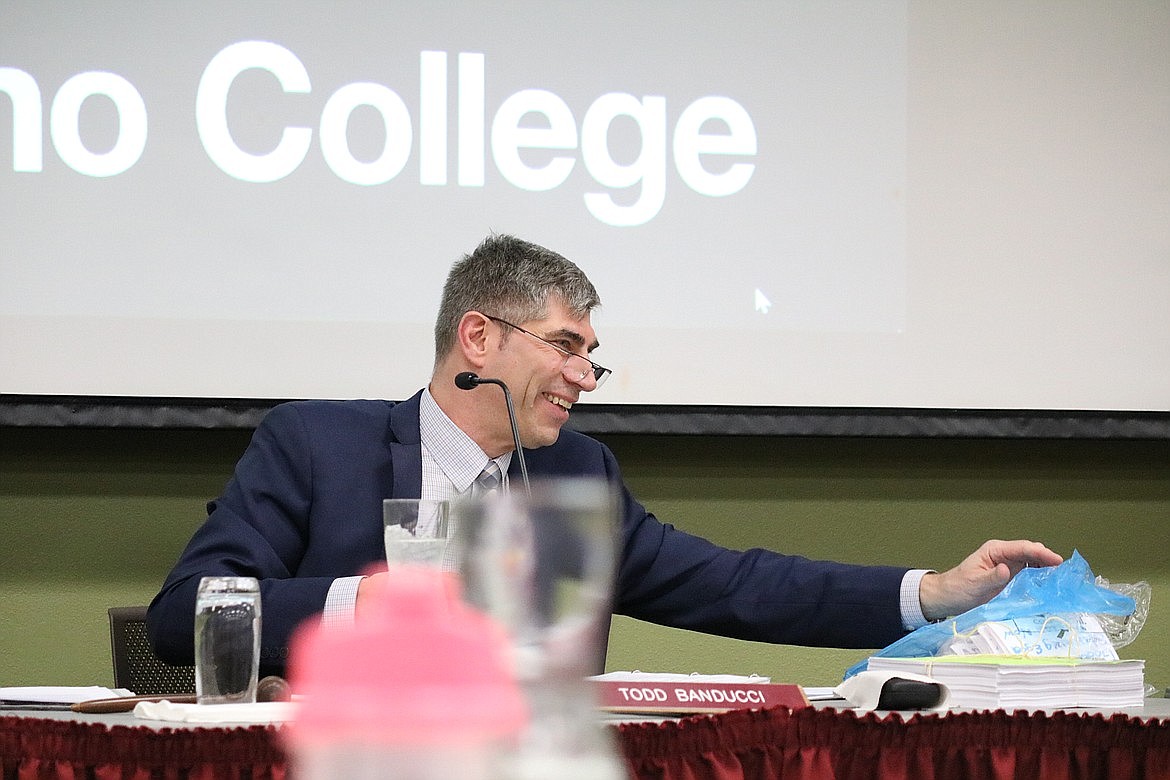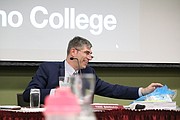Analysis: Elections have consequences, and NIC is facing them
Elections have consequences. Just look at Kootenai County.
A fractured and feuding elected board of trustees has left North Idaho College in crisis.
Its accreditation is in jeopardy — which could affect whether students can transfer credits from the two-year college, or receive state-funded scholarships. The chaos could affect enrollment, as community colleges across the nation struggle to attract students. More than $4 million in charitable gifts could be jeopardized, NIC’s foundation told regional accreditors.
Now, the state is stepping in.
By early May, the State Board of Education will appoint three new trustees, who will join two holdovers elected in November 2020. The balance of power at NIC will shift from locally elected policymakers to state appointees. At least until November, when the three State Board-filled positions will be on the ballot.
In another election, one certain to carry consequences.
How NIC got here
The November 2020 election proved crucial. The local Republican Central Committee captured control of the NIC governing board. Incumbent Todd Banducci won in an uncontested race, Greg McKenzie ousted incumbent Joe Dunlap, and Michael Barnes secured a third board seat.
Their election was “partially based on the idea of eliminating tax-based diversity initiatives at North Idaho College and other Idaho colleges and universities,” local human rights groups wrote in March.
That was when the groups filed their first complaint to the Northwest Commission on Colleges and Universities, the region’s accrediting body. This complaint centered on Banducci, the newly named board chair, and what the complainants called a series of “escalated acts” that violated students’ and staff members’ civil rights.
In their second complaint to NWCCU, in November, the groups challenged several decisions made by Banducci, McKenzie and Barnes: a refusal to adopt an infectious disease policy, as coronavirus cases surged in the Panhandle; a 3-2 vote to fire President Rick MacLennan, without cause; a subsequent 3-2 decision, discussed largely behind closed doors, to promote wrestling coach Michael Sebaaly as interim president.
Amidst the accreditation complaints — and an exodus of several top administrators — the divided board began breaking down as well.
Barnes resigned in January, amidst questions of residency.
Last week, the four remaining trustees failed to agree on a replacement for Barnes. And after months of publicly sparring with Banducci and McKenzie, longtime trustees Christie Wood and Ken Howard announced their resignations, effective May 3.
That would leave only Banducci and McKenzie in office — and the board without a quorum to meet.
Why the State Board is stepping in
Idaho law allows the State Board to fill multiple vacancies on a community college board of trustees. The board is expected to name successors to Barnes, Wood and Howard on May 6.
The appointment process is relatively straightforward, and not unprecedented. In 2017, the State Board appointed trustees for Idaho Falls’ newly formed College of Eastern Idaho.
But community colleges are complex. They receive a mix of local property taxes, tuition and fees and state dollars — and in NIC’s case, state general funds make up $13.2 million of a $45.1 million budget. Consequently, the relationship between the State Board and locally elected community college boards is complicated.
In a December letter to NIC trustees, State Board President Kurt Liebich and executive director Matt Freeman acknowledged as much. While urging trustees to set aside “parochial and partisan interests” and act in the school’s best interests, Liebich and Freeman also reminded trustees that the State Board retains jurisdiction over all educational institutions. “While the State Board respects the local governance of community colleges, it also has a legal and moral interest in the health of the colleges.”
And in February, an NWCCU peer panel recommended the State Board “implement supervisory oversight of immediate actions by the NIC board of trustees and administration,” while accreditors placed the college on probation. Ultimately, the NWCCU didn’t go this far, instead issuing a warning to the college.
But even if the State Board takes no active role in NIC’s governance, the State Board will nonetheless make an imprint on the board of trustees. As with all things NIC, the appointment process has been polarizing.
Banducci did not respond to interview requests. But on social media, Banducci echoed a narrative voiced by the Idaho Freedom Foundation, accusing the State Board of trying to take over the college and usurp conservative voters.
“They are moving at lightning speed to cram it down our throats!!” Banducci wrote on his Facebook page. “They are trying to take it out of the hands of the voters. Pushing through their agenda via bureaucratic fiat.”
While the State Board is composed of seven gubernatorial appointees and an elected state superintendent, Wood is confident that the board will set aside politics and continue to remain focused on students. And she has no problem with the timetable.
“I appreciate that they’re willing to move so quickly, because the business of the college will come to a standstill without it,” she said in an interview Wednesday.
And where things go from here
Sebaaly says he hopes the State Board will appoint trustees who will be “collaborative” and willing to work with Banducci and McKenzie, the two holdover trustees who voted to promote Sebaaly nearly six months ago. But in the midst of the turmoil, NIC’s wrestling coach-turned-president uses coachspeak to assess the situation. He has heard plenty of local rumors about would-be trustees, but he’s trying not to get caught up in it.
We will trust the process,” he said in an interview Wednesday. “That decision is in the State Board’s hands.”
For the next six months, at least.
The State Board appointments will only run through November. There’s nothing that would preclude the newly appointed trustees from running for four-year terms. Nor is there anything that would prevent Wood or Howard from running for their old trustee seats. But Wood — an 18-year NIC trustee who also serves on the Coeur d’Alene City Council — says there are plenty of other people who could serve the college. “I would recognize that I’m a bit of a lightning rod right now,” she said.
Still, Wood will watch closely. She sees the NIC board as a textbook example of what happens when partisan interests focus their attention on nonpartisan offices: an example of what is happening, and could continue to happen, at the K-12 level, in school board elections.
“This has really been an eye-opener in our region,” she said in an interview. “I do think our voters will be paying attention in November.”
McKenzie agreed that the board had become dysfunctional, but not surprisingly, he sees the politics differently. He says local voters had tired of Wood and Howard and their obstructionist tactics.
But in written responses to questions from Idaho Education News, McKenzie echoed Wood on another key point. After the State Board makes its appointments, a “stop-gap effort” to keep the college running, McKenzie hopes voters will pay attention.
“There are big decisions that need to be made and it’s the voters in November who should decide who the big decisionmakers are,” McKenzie said.
Kevin Richert writes a weekly analysis on education policy and education politics. Look for his stories each Thursday.
More reading: Todd Banducci is a polarizing presence, at the center of NIC’s dysfunction.





